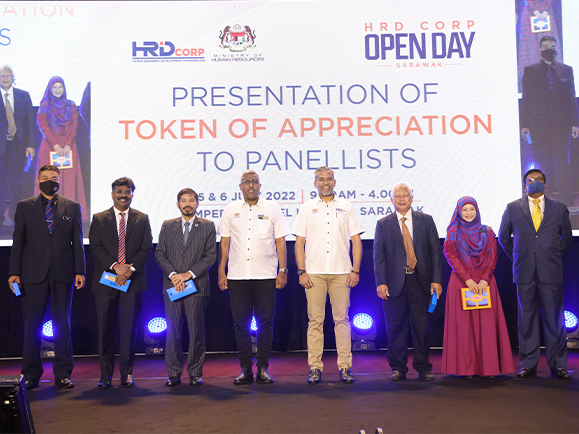News & Articles
NATIONAL HR FORUM HIGHLIGHTS THE IMPACT OF MINIMUM WAGE VS LIVING WAGE ON NATIONAL PRODUCTIVITY AT HRD CORP OPEN DAY IN SARAWAK



Kuching, 6 July 2022 — Malaysia’s implementation of the new minimum wage on 1 May
following the gazettement order from the Ministry of Human Resources, is a timely move. This
is because, according to the Department of Statistics Malaysia’s (DOSM) Labour Productivity
Report for Q1 2022, Malaysia’s labour productivity as measured by value added, expanded to
5.0 per cent compared to 3.6 per cent in Q4 2021, while hours worked increased to 4.6 per
cent compared to 2.3 per cent in Q4 2021.
Nevertheless, according to Dato’ Sri Dr. Mohd Uzir Mahidin, Malaysia’s Chief Statistician, Department of Statistics Malaysia (DOSM), the new Malaysian minimum wage is still far behind other countries and Malaysian workers are still paid less than workers in benchmark economies.
These are some of the points discussed at a National Forum titled ‘Malaysia at the Crossroads: Living Wage vs Minimum Wage and its Impact on National Productivity’ in the city. The forum, organised by Human Resource Development Corporation (HRD Corp) was officiated by its Chief Executive Datuk Shahul Dawood, and featured industry leaders and subject matter experts
These included Dato’ J. Palaniappan, Council Member of the Federation of Malaysian Manufacturers (FMM) as moderator and panellists such as Datuk Hj. Shamsuddin Bardan, Executive Director Malaysian Employers Federation (MEF), Dato’ Nathan K Suppiah, Vice President, Federation of Malaysian Manufacturers (FMM), Puan Hjh. Nor Hafizah Mohd Arop, Director of the Malaysia Productivity Corporation (MPC), Sarawak Region, Wan Zaifolludean Wan Zakaria, Deputy Director of the Department of Labour Sarawak and Dato’ Sri Dr. Mohd Uzir Mahidin from DOSM.
The forum is the third in a series of National Forums organised by HRD Corp across Malaysia to discuss a wide range of pressing issues on human capital development in the country. During the forum, the panellists discussed the feasibility of implementing the RM1,500 minimum wage across the board, whether Malaysia needed to start looking at living wage instead and whether local businesses, particularly those in Sarawak can afford the increase.
According to Wan Zaifolludean from the Department of Labour Sarawak, the implementation of the minimum wage is a good move for employees, “It will provide adequate social security to employees by ensuring that their basic needs are met. This will also encourage supply chain efficiency through technological investments that can also raise productivity.”
Wan Zaifolludean also noted that the majority of Sarawak businesses have complied with the order. In fact, only 2.1% of businesses have been found to be non-compliant.
Datuk Hj. Shamsuddin Bardan, Executive Director Malaysian Employers Federation (MEF) said its members have complied with the new minimum wage order as it is a statutory requirement. However, when discussing the implementation of a living wage, he believes that a lot more studies need to be done to strike a balance between ensuring employees can afford a minimum living standard, and the capability of employers to pay wages that commensurate with employee productivity.
Datuk Shamsuddin added, “The government should provide tax incentives for companies that may help to reduce the impact of increase in minimum wages or set up an incentive payout based on employee performance. They should also look at creating government subsidies for employers affected by the new minimum wage increase, particularly SMEs.”
According to Hajah Nor Hafizah from MPC, “While the regular review and increase in minimum wage is necessary, conversations on living wage and other forms of wage increases require a different approach. We need to address the skills mismatch in this country first, in order to achieve productivity growth, only then is wage increases justified.
Hafizah added that innovation and diffusion are necessary to address the current skills mismatch. This will require collaboration between industry, academia and ministries.
Dato’ Nathan from FMM said, “The implementation of the minimum wage will enable workers and their families to exit poverty, improve standard of living and strengthen purchasing power for Malaysians. It will also force more people to reskill and upskill and encourage stronger interests in TVET and STEM education. However, it may have a knock-on effect on all wage levels, cause employers to reduce or limit hiring and increase the cost of doing business, which will lead to price hikes for goods and services. At FMM we believe that salary paid must be in line with productivity and wage movements must be determined by market forces.”
The HRD Corp National Forum series was organised in conjunction with HRD Corp Open Day, Sarawak 2022, which was held at Imperial Hotel, Kuching. The two-day event featured a series of activities designed to provide updates on HRD Corp’s latest initiatives and service offerings to its trainers, training providers, and registered employers. It also served as a platform for HRD Corp to engage with members of the public to meet their training, employment and income generating needs.
For more information, please visit www.hrdcorp.gov.my/openday.
Nevertheless, according to Dato’ Sri Dr. Mohd Uzir Mahidin, Malaysia’s Chief Statistician, Department of Statistics Malaysia (DOSM), the new Malaysian minimum wage is still far behind other countries and Malaysian workers are still paid less than workers in benchmark economies.
These are some of the points discussed at a National Forum titled ‘Malaysia at the Crossroads: Living Wage vs Minimum Wage and its Impact on National Productivity’ in the city. The forum, organised by Human Resource Development Corporation (HRD Corp) was officiated by its Chief Executive Datuk Shahul Dawood, and featured industry leaders and subject matter experts
These included Dato’ J. Palaniappan, Council Member of the Federation of Malaysian Manufacturers (FMM) as moderator and panellists such as Datuk Hj. Shamsuddin Bardan, Executive Director Malaysian Employers Federation (MEF), Dato’ Nathan K Suppiah, Vice President, Federation of Malaysian Manufacturers (FMM), Puan Hjh. Nor Hafizah Mohd Arop, Director of the Malaysia Productivity Corporation (MPC), Sarawak Region, Wan Zaifolludean Wan Zakaria, Deputy Director of the Department of Labour Sarawak and Dato’ Sri Dr. Mohd Uzir Mahidin from DOSM.
The forum is the third in a series of National Forums organised by HRD Corp across Malaysia to discuss a wide range of pressing issues on human capital development in the country. During the forum, the panellists discussed the feasibility of implementing the RM1,500 minimum wage across the board, whether Malaysia needed to start looking at living wage instead and whether local businesses, particularly those in Sarawak can afford the increase.
According to Wan Zaifolludean from the Department of Labour Sarawak, the implementation of the minimum wage is a good move for employees, “It will provide adequate social security to employees by ensuring that their basic needs are met. This will also encourage supply chain efficiency through technological investments that can also raise productivity.”
Wan Zaifolludean also noted that the majority of Sarawak businesses have complied with the order. In fact, only 2.1% of businesses have been found to be non-compliant.
Datuk Hj. Shamsuddin Bardan, Executive Director Malaysian Employers Federation (MEF) said its members have complied with the new minimum wage order as it is a statutory requirement. However, when discussing the implementation of a living wage, he believes that a lot more studies need to be done to strike a balance between ensuring employees can afford a minimum living standard, and the capability of employers to pay wages that commensurate with employee productivity.
Datuk Shamsuddin added, “The government should provide tax incentives for companies that may help to reduce the impact of increase in minimum wages or set up an incentive payout based on employee performance. They should also look at creating government subsidies for employers affected by the new minimum wage increase, particularly SMEs.”
According to Hajah Nor Hafizah from MPC, “While the regular review and increase in minimum wage is necessary, conversations on living wage and other forms of wage increases require a different approach. We need to address the skills mismatch in this country first, in order to achieve productivity growth, only then is wage increases justified.
Hafizah added that innovation and diffusion are necessary to address the current skills mismatch. This will require collaboration between industry, academia and ministries.
Dato’ Nathan from FMM said, “The implementation of the minimum wage will enable workers and their families to exit poverty, improve standard of living and strengthen purchasing power for Malaysians. It will also force more people to reskill and upskill and encourage stronger interests in TVET and STEM education. However, it may have a knock-on effect on all wage levels, cause employers to reduce or limit hiring and increase the cost of doing business, which will lead to price hikes for goods and services. At FMM we believe that salary paid must be in line with productivity and wage movements must be determined by market forces.”
The HRD Corp National Forum series was organised in conjunction with HRD Corp Open Day, Sarawak 2022, which was held at Imperial Hotel, Kuching. The two-day event featured a series of activities designed to provide updates on HRD Corp’s latest initiatives and service offerings to its trainers, training providers, and registered employers. It also served as a platform for HRD Corp to engage with members of the public to meet their training, employment and income generating needs.
For more information, please visit www.hrdcorp.gov.my/openday.








